(See the other posts in this series here)
I missed doing a Germany vs. the US comparison post in April, and not because I’ve run out of things to share, either. My running list keeps growing, so today I’m sharing a few more things that are just different over here.

The Drinking Age
Unlike the legal drinking age of 21 in the States, over here kids can start drinking beer and wine in restaurants (accompanied by their parents) at age 14. Theoretically, they could have a glass at home at an even earlier age. At 16, they can purchase beer and wine, and at 18, they can buy hard liquor.
Since being allowed to drink is considered a rite of passage, my kids were both impressed when an eight-hour plane ride suddenly rendered them of legal age. Neither one is what I would consider a heavy drinker–in fact, I can count on the fingers of one hand the time my almost-eighteen-year-old has had a glass of anything–but the freedom to be able to in theory is better than the reality!
My daughter bought this fruity concoction (because she could) but after one glass it sat in the fridge until it lost its fizz.
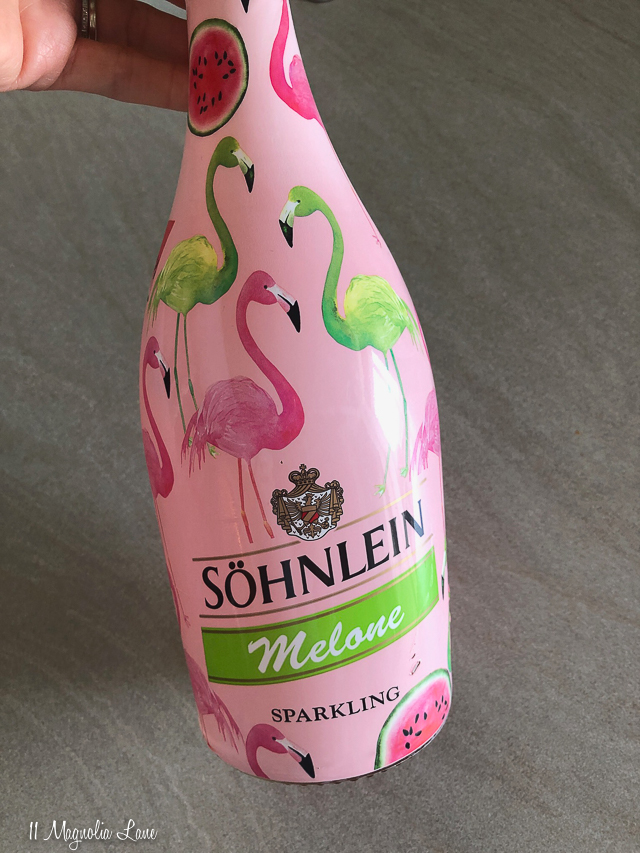
There also seem to be no open container laws here. We often pass people drinking a beer while we’re out hiking, and it’s not out of the ordinary to see someone with a beverage on the train or bus. I think I’ve mentioned before that Amazon.de delivers alcoholic beverages; you just have to upload proof of age to your account and then boxes arrive like magic on your doorstep.
Just a side note on cost and quality…beer and wine are super-inexpensive over here. Obviously the cost of importing European brands drives prices higher in the States, but it still warms my heart to be able to buy a 5€ bottle of wine that would be $20 at home. Beer is as inexpensive as water, and the ingredients are strictly mandated over here–just barley, hops, and malt (so it’s like a health drink, right?). I also find the wines to have fewer sulfites and I rarely, if ever, get a headache from European wines.
Recycling–Not for the Faint of Heart!
So, obviously if we’re drinking all of these bottles of wine and beer, recycling is a big part of our lives. Germans are deadly serious about their trash and recycling and when we first arrived, this actually caused me major stress! While it has never happened to me (yet!), lots of friends have told me stories about how they were “counseled” by their neighbors about their poor trash sorting skills.
This varies from town to town, but in Stuttgart we have separate cans and recycling for paper/cardboard, biodegradable waste (although many people keep a compost pile and don’t need to toss this), and restmüll (actual trash). These are my bins for my gelb sack trash–to be discussed further below–and paper.
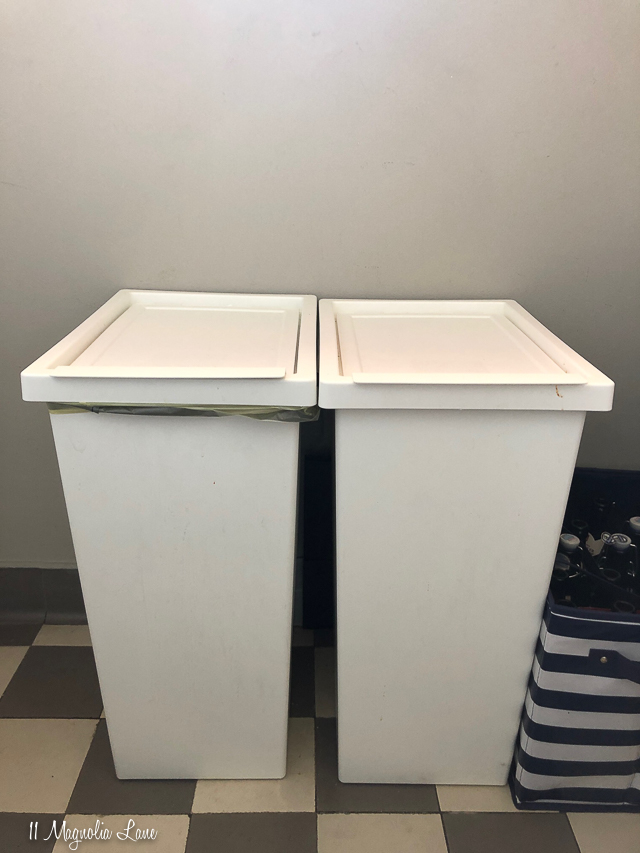
Then we take our glass like wine bottles and glass jars to local recycling centers and sort it by color (white, green, and brown). Glass and plastic bottles that we had to pay a deposit on (called pfand) at purchase get returned to the store where we bought them, and we get a coupon for a discount off of our next purchase. This is my bin o’ pfand returns:
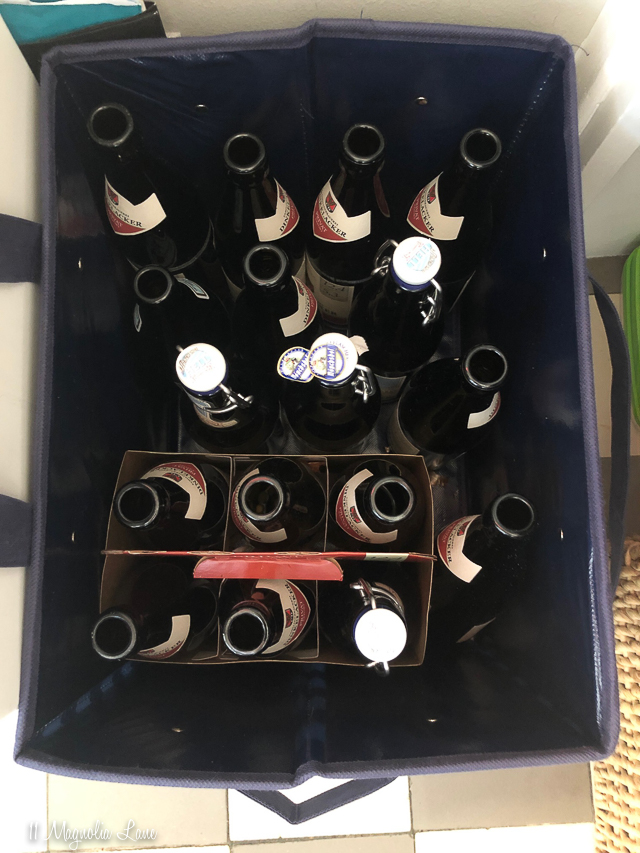
This is the pull out trash under my sink…restmüll is in the front and I use the other two bins for our glass recycling.
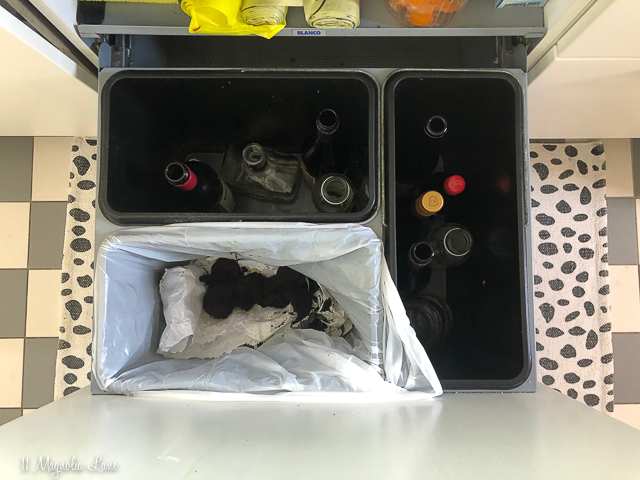
Last, but not least, gelb (gelb=yellow) sacks hold light-weight product packaging. Here’s the list of what that means: plastic packaging (yogurt or sour cream),tetra-pack (as for milk or juice), packaging with plastic in front and cardboard on the back (like pasta boxes), aerosol cans (ex: hairspray), boxes and tins, screw tops (from the glass jars or bottles that you recycled), styrofoam, film and plastic bags, and pet food packaging. We also have to throw in American aluminum cans and plastic drink bottles that don’t carry a pfand mark on them. Phew!
The yellow bags get tied up and put outside in our trash room, and the trash guys come and pick up. Different kinds of trash get picked up on different days and at different intervals, although I have given up on keeping track of that. Another interesting thing is that they must have a master key for all of the trash rooms because they just let themselves in and take care of it.
The cost of trash removal is covered in the nebenkosten (the utilities portion of our rent), but I believe the landlords pay according to how many cans are at the building (if any of you know differently, please correct me). That’s probably why the cans are locked up!
Laundry
Laundry is different, too. We were told to leave our machines at home because everything is 220V over here and the base gives us loaners to use while we’re here (even though we live off-base). I was so thankful for this because the cost of just purchasing the basic 220V household appliances we needed was pretty steep.
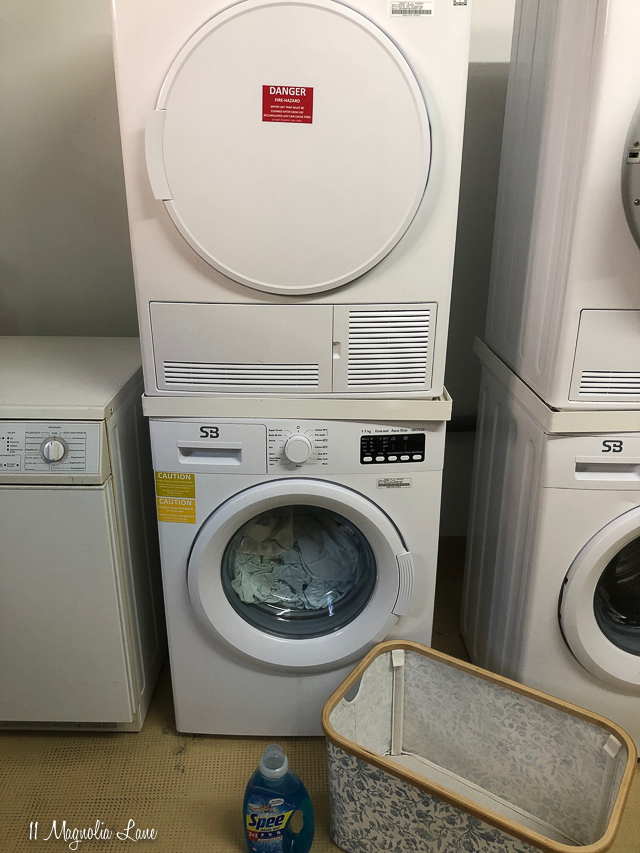
Our machines are in a communal laundry area in our basement, but each apartment has their own machines. Of course the water and air temperatures are in Celsius.
The cycle length is much longer in German machines–try three hours to run a load of wash! Fortunately, there’s a 60 minute express cycle that I use for everyday loads. The machines are much smaller so we run more loads, and since the water is so hard here, things work best when we use their laundry detergents.
The dryer isn’t vented to the outside like we’re used to in the States; instead, there’s this drawer that’s a reservoir for the extracted water:
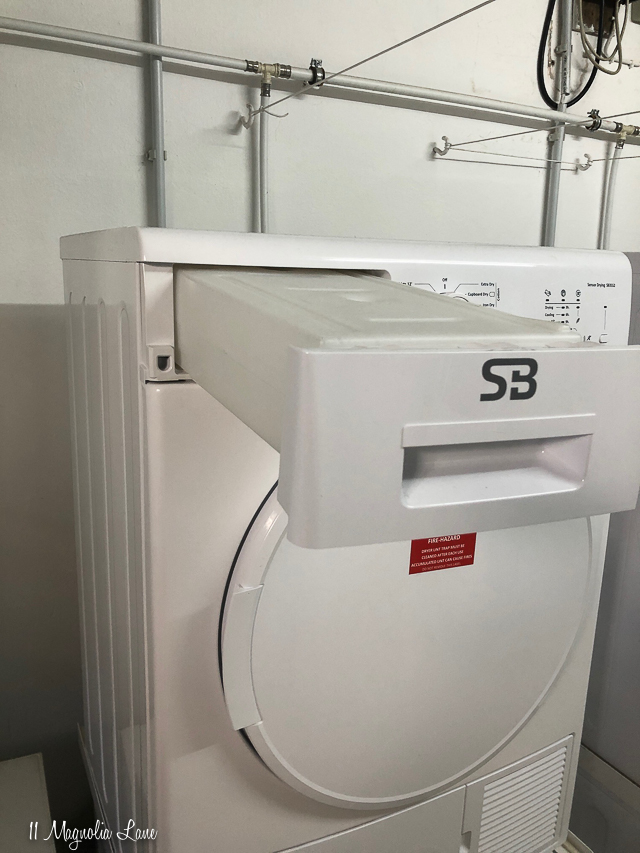
Every time we run a load, we have to dump the water in the laundry sink. That being said, I only dry sheets and towels now, because it’s the German way to hang laundry to dry. Electricity is super-expensive here, and dryers use a ton of electricity, so even apartment-dwellers hang their laundry out their windows or set up a rack on their balconies.
Driving
I grew up in and around Washington, DC, so I’m used to city driving, but city driving in Stuttgart is on an entirely different level. This picture from my daughter’s bedroom shows you how we have cars lining both sides of the street. Most of the downtown streets are this way, so if you happen to run into someone coming the other way, one of you has to pull over or back up or you really will run into each other!
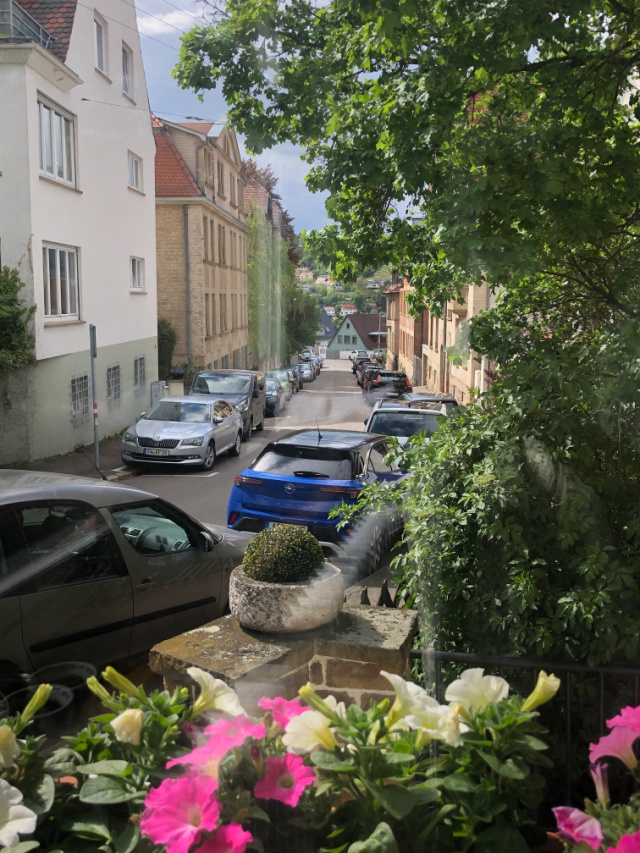
Throw in some crazy steep hills, switchbacks, and lots of trains, buses, and bicyclists, and driving takes 110% of my concentration. It’s strictly illegal to even touch your cell phone while driving in Germany, and with good reason.
We had to take a stringent written test when we arrived to get our (military-sponsored) drivers’ licenses. While they drive on the same side of the road as we do, all of the signs are different, and of course speeds are in kilometers. Their right of way rules are quite different, too, and there’s no right turn on red. Also, if you can’t parallel park like a boss, then you probably shouldn’t live in a city in Europe unless you have a garage! We have one garage spot, but my husband’s car gets it, so the Beetle has been wedged into many a tiny space (and without a backup sensor or camera, thank you very much). The parking space wars are kind of like our version of the Hunger Games and there has to be a very good reason for me to give mine up!
If you’ve visited Europe, then you know that 99% of the cars are manual transmissions, so if you’re going to rent a car, be prepared to pay more for an automatic. When my daughter and I went to Mallorca, that wasn’t even an option, but fortunately my first three cars were stick shift so it wasn’t an issue. They’re actually easier to drive with all of the hills and mountains, which is probably the reason for them being so prevalent over here.
Last but not least, here in Germany you can’t get a driver’s license until you’re 18, and their driving school/test is much more challenging than ours. They also have excellent public transportation systems (likely because Germany is only about the same size as the state of Montana). As a result, people over here who get a license go to some extra trouble to do it, and in my opinion they just drive better in general than we do. Anyone who has merged down to one lane of traffic in Germany appreciates the Reißverschlusssystem, or zipper merge, that they use over here. In DC, people would rather die than let someone from the next lane merge in front of them, but here they file in either/or and it all it flows perfectly.
There you have it–if you have anything to add, just drop a comment below. Thanks for stopping by!








